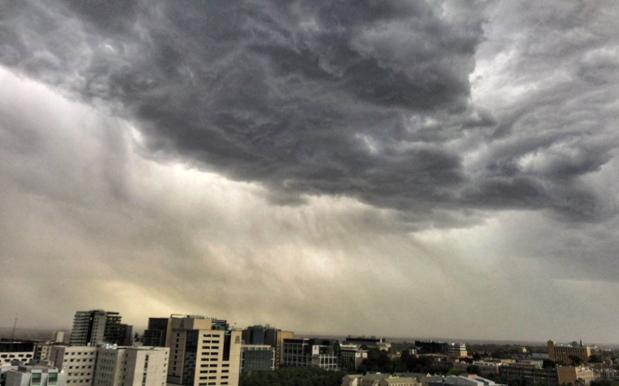
After Melbourne‘s horrendous day of scorching weather on Monday, the city was then treated to a similarly-horrendous thunderstorm that night.
That storm managed to bring on a phenomenon called ‘thunderstorm asthma’, and on this occasion, it’s tragically resulted in at least two deaths.
Head of the Alfred Hospital’s allergy and asthma department Associate Professor Mark Hew told Fairfax that ‘thunderstorm asthma’ was created by extremely strong winds stirring up pollen and other irritants in the air, and is often a wake-up call for people with mild or undiagnosed asthma.
It does also mean that emergency services are usually exhausted in very short spaces of time, due to the overwhelming demand.
In Melbourne on Monday evening, there were 1900 calls placed for ambulance services within just 5 hours.
Double the usual amount of patients were admitted, and the state Health Department had to send out extra Ventolin and other supplies to some hospitals.
At least 30 people are in intensive care across the state.
State health commander Paul Holman, a paramedic of 40 years, told media he had never seen anything like it in his career – at one stage there was 190 people waiting for ambulance assistance. He said the majority of the patients needed to be taken to hospital rather than being treated at the scene.
“Every ambulance and ambulance manager was recalled. It was an unprecedented night…I have never seen the computer dispatch of Melbourne look like it. It was what we call a sea of red.”
Paramedics have now told Fairfax Media that they believed there was more than two deaths from the catastrophe.
One intensive care paramedic, who chose not be named, said ambulances took more than an hour to reach several urgent ‘code one’ calls, and that he’d heard of “numerous deaths”.
“It sounds like a lot more than two people died.”
However, a spokesperson for Ambulance Victoria said in a statement, it was only aware of two cases “where patients with respiratory symptoms were unable to be revived by paramedic crews”.
The first fatality was 20-year-old Hope Carnevali, who passed away on her front lawn after paramedics were unable to revive her. The other was 18-year-old Omar Moujalled.
He said in one of the cases, it took the ambulance 31 minutes to arrive. In the other, the other ambulance arrived within 15 minutes, but was still too late.
The ‘thunderstorm asthma’, which has been described as putting more strain on the state emergency services than a mass terror attack, has led Health Minister Jill Hennessy to order a review into Melbourne‘s emergency service response.
Source: The Age.
Photo: Twitter / Matthew Wu.



